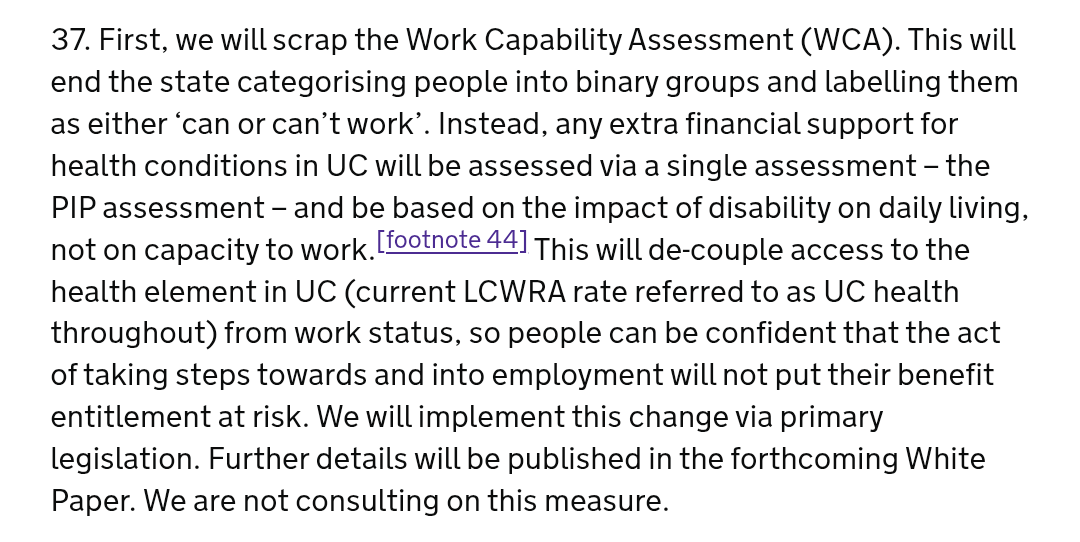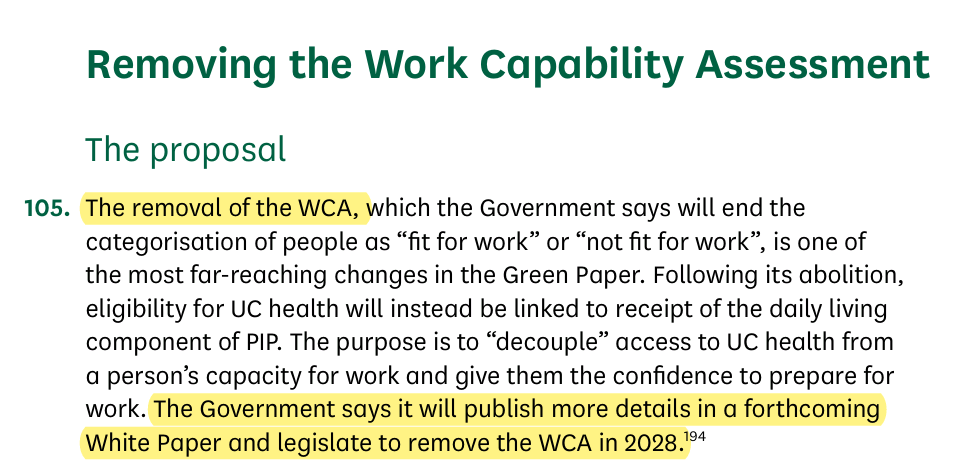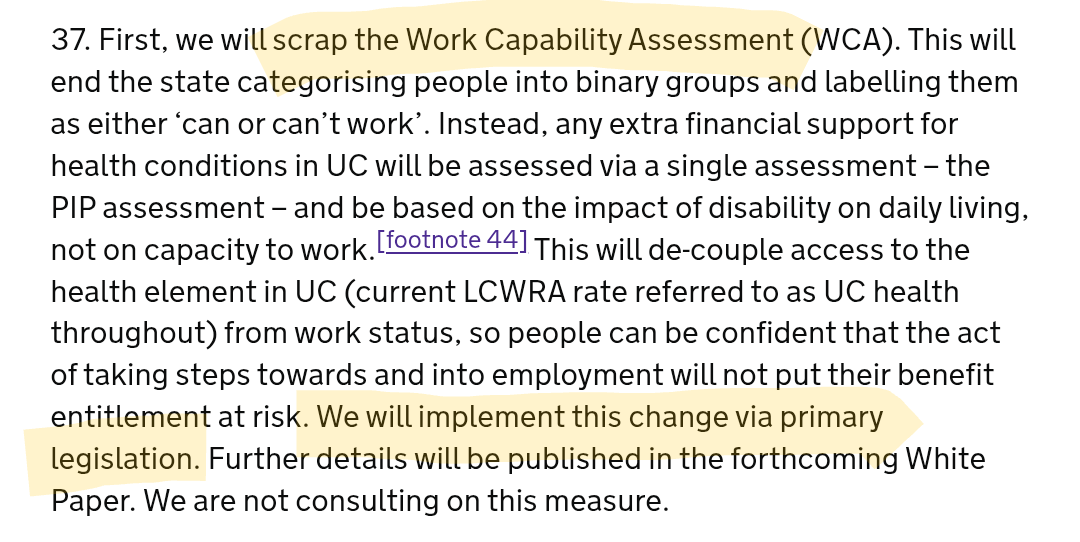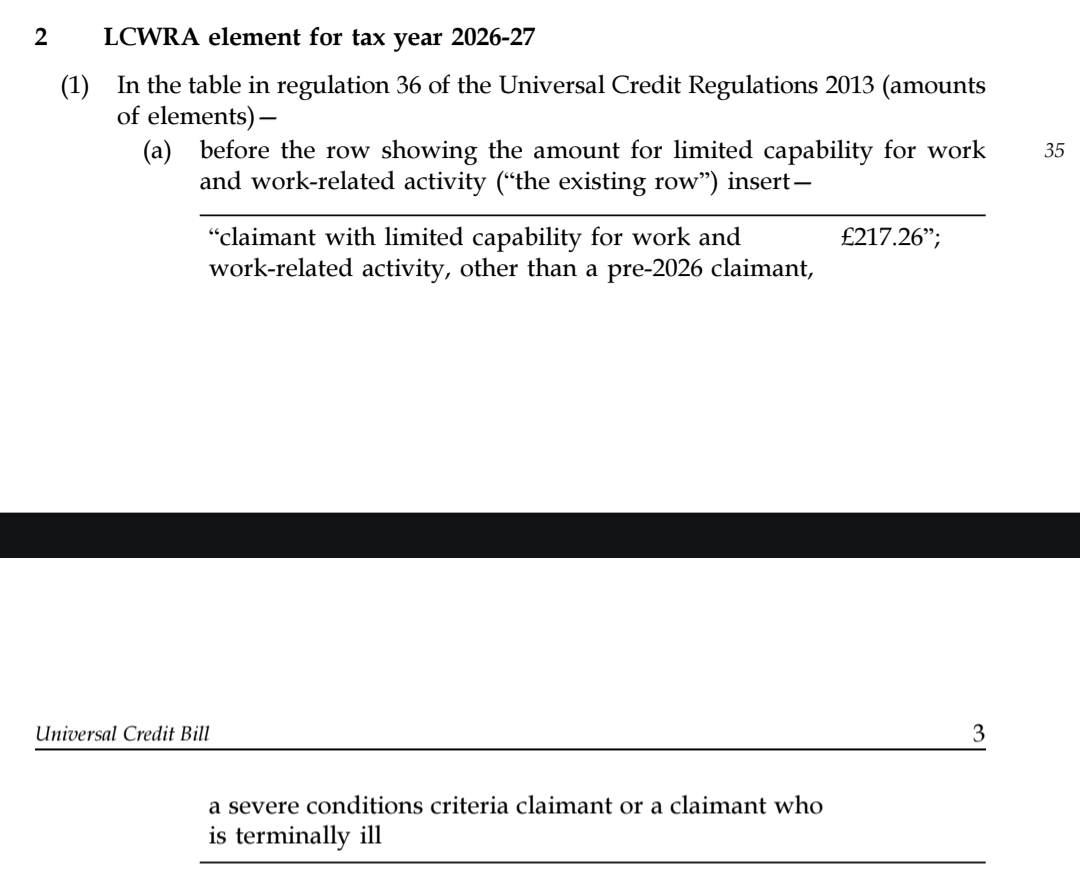The Universal Credit Bill becomes law. Here are the changes to disability benefits you need to know
Comments
-
I have been consistent throughout. The FOI is useful, but it reflects the system as it stood. DL PIP as gateway was not part of the Green Paper consultation. Paragraph 37 refers to aligning support with daily living needs, but it does not propose scrapping the Work Capability Assessment or formalising PIP as the sole gateway.
That shift has been signalled, yes, but it has not been legislated or consulted on directly. That distinction matters, especially when safeguarding is at stake. I have never denied the Government’s direction of travel. I have said the legislative framing has not yet been published. That is not evasion. It is precision.
Urgency is not the issue for me. Others may feel differently, but I am holding mine for when the Government puts its intentions into writing. The White Paper will show who is affected, how exclusions are defined, and what was carried forward from consultation. That is when scrutiny becomes meaningful and when accountability begins.
0 -
The 4-point PIP rule was included in draft legislation. That made it a formal proposal, not speculation. Protesting a published clause in a bill is not the same as responding to a signal without legislative framing. That distinction matters. I’ve never said we shouldn’t challenge the White Paper. I’ve said I prefer to respond to published proposals, not assumptions. That’s not hypocrisy, it’s consistency.
I raised concerns about the Green Paper, met with my MP, and supported Scope’s public challenge. I’ve acted, and I will continue to do so. The Timms PIP review may well change eligibility criteria, but until that happens, the current descriptors remain the basis for scrutiny.
That’s why the FOI data is relevant, but it doesn’t define future eligibility, and it doesn’t confirm how DL PIP will be used as a gateway. That’s why I’ve said the White Paper matters. It will show what’s being carried forward, what’s being formalised, and who is affected.
0 -
Paragraph 37 *literally* states that the Work Capability Assessment will be scrapped in the first line of that paragraph and that access to UC Health will be via qualification of DL PIP. It *literally* states that this will be implemented via Primary Legislation.
Your revisionism of the facts is so easily disproven! Good grief. You really are so intent on believing your own fantasy version.1 -
0
-
What a lot of quarrelling. Why don't we all wait and see what comes to pass?
3 -
I said that if you protested the 4 point PIP rule based on the Green Paper before the UC & PIP Bill was published (so between March and June) that would make you a hypocrite.
You've said you did raise concerns about the Green Paper with your MP so you did vocalise your opposition based on what you would call "speculation" (the Green Paper).
You've then contradicted yourself again by saying "the current descriptors remain the basis for scrutiny" but then in previous posts you've said that the FOI isn't useful for protesting because it's a snapshot of the eligibility criteria now.
Your apparent need to be right is blinding you to the actual evidence and reality of the situation and causing you to make multiple contradictions and illogical statements.1 -
I've already provided my reasons for not waiting for the publication of the White Paper so your suggestion is something I cannot inherently get behind. You have the option of not engaging with this thread if you find it jarring.
1 -
3
-
I, along with many of our members, opposed the repeal of the Work Capability Assessment throughout the passage of the Welfare Reform Bill. We engaged in direct lobbying and sustained dialogue with MPs and ministers.
The legislation is now on the statute book, and the Limited Capability for Work element has been formally removed.
Paragraph 37 is frequently quoted, but it merely confirms the implementation of measures already enacted. It does not reopen the issue. The reference to primary legislation concerns a process that has concluded, not one available for reversal. Repeating it as if the repeal remains under debate risks misdirecting scrutiny and confusing the legislative status.
In my view, our strategic focus should now shift to the design of the replacement regime. This includes how eligibility for the new Health Element will be defined, who may be excluded by a Daily Living PIP gateway, what routes exist for challenge or amendment, and how safeguarding and transitional protections will operate.
The new framework has not yet been published. Until the White Paper appears, any claims about scoring thresholds or exclusions remain speculative. Understandably, speculation can be deeply unsettling for members, especially when it begins to outpace confirmed detail. That is precisely why scrutiny must be anchored in what is structurally real and still open to influence.
FOI data may illuminate risks under the previous system, but it does not describe the current legislative settlement. With the Bill enacted, scrutiny is best directed at shaping what comes next.
Others may choose to campaign to overturn what is already in law. That is their prerogative, and I wish them well. My priority is the detail still being shaped, where scrutiny, lobbying, and targeted pressure on damaging proposals can still make a difference.
0 -
I agree.
Things are bad enough for us without people arguing and point scoring.
Personally I am waiting for an official announcement to be made and hopefully that will happen soon.
2 -
You are so badly wrong. The WCA scrappage was NOT in the UC Bill and has NOT been passed via Primary Legislation yet
This is the UC Bill which does not contain any reference to the WCA being scrapped:
https://bills.parliament.uk/publications/62123/documents/6889The Big Issue today have published an article precisely on the upcoming scrappage of the Work Capability Assessment to be included in the autumn White Paper which has NOT been voted on by Parliament yet:
https://www.bigissue.com/news/social-justice/benefit-cuts-disabled-people-work-capability-assessment/
You are gravely misleading people on here.
There is still an opportunity to ensure the WCA scrappage doesn't go ahead.
3 -
jw68, miscreants is the right word for them.
I'm 100% persuaded that nothing has changed since I claimed Incapacity Benefits in 2006. DWP has knowingly put me at risk of harm and homelessness by denying my rightful entitlement ever since! I've told them I'm just waiting to retire so they'll leave me alone. They have no intention of leaving me alone just yet though 😔
I have identified what I believe is the root of the scam which is a 'Correction Slip' inserted into the ESA regs by IDS in June 2011 which was carried into the 2012 Welfare Reform Act unscrutinised and unchallenged.
It didn't correct anything; it corrupted the ESA regs. It was a corruption slip. I've tried and tried to explain it on this forum but members still believe it was so long ago that it no longer matters. It does.
In 2015, IDS suddenly spotted "a fundamental flaw in the regulations", new cuts were agreed and ESA was further corrupted by the removal of reg 29 -(2)(b) - exceptional circumstances - from the WCA process. That was the Welfare Reform and Work Act 2016.
Reg 35 -(2)(a)b) under Part 6 of the ESA regulations is the equivalent of reg 29 -(2)b) under Part 5.
In 2008, there was a Work-Related Activity Assessment (WRAAt) (Part 6) and a Work Capability Assessment (WCA) (Part 5) to determine eligibility for an award - in that order.
1 -
Hi and welcome to Scope! You shouldn't have to fight to be heard on here!!
I want to understand and members need to understand these changes to WORKING-AGE BENEFITS.
Please start a new thread, perhaps with Scope's help - this is the only platform I use - we need information and facts, urgently.
TYVM for all you've done and are doing 🤝
2 -
I must respectfully correct your claim that “The WCA scrappage was NOT in the UC Bill and has NOT been passed via Primary Legislation.” There is no standalone “WCA scrappage bill” because the repeal is being delivered through amendment to existing legislation, not via a separately titled instrument. This is a standard parliamentary mechanism for structural reform, particularly where dismantling provisions are embedded within broader welfare legislation. The claim is demonstrably inaccurate and risks misleading members about the current statutory position.
The information outlined below reflects statutory amendments already enacted and scheduled for implementation. All of it can be confirmed via official sources on GOV.UK, which remains the most reliable source for verifying legislative status and statutory detail.
The Universal Credit Act 2025 contains explicit statutory amendments that abolish the Limited Capability for Work and Work-Related Activity element for new claimants and replaces it with the Universal Credit Health Element. These changes are not speculative proposals, they are embedded in primary legislation, duly passed, and scheduled for implementation from April 2026.
From April 2026, the legal framework governing new claimants will undergo substantial reform under the Universal Credit Act 2025. This legislation abolishes the Limited Capability for Work and Work-Related Activity element and replaces it with a reduced Universal Credit Health Element. These are not speculative proposals awaiting approval, they are enacted provisions embedded in statute.
Equally significant is the introduction of the Chance to Work Guarantee, which removes most WCA reassessments for existing ESA and UC claimants awarded LCWRA. This too is not aspirational, it is legislated and binding.
It is important to clarify that these changes do not amount to a simple abolition of the LCWRA element. Rather, it has been restructured and rebranded as the UC Health Element, with revised eligibility criteria and markedly lower payment rates. For new claimants, this will equate to roughly half the current LCWRA amount. Existing claimants will retain their full entitlement via transitional protection. This is not a cosmetic adjustment, it represents a fundamental shift in both eligibility and financial support.
Together, these measures constitute the first two phases of the WCA repeal. The final phase, realigning eligibility with Personal Independence Payment Daily Living criteria and transitioning remaining claimants, is scheduled for 2028/29, subject to the Timms consultation on PIP reform. Nonetheless, the trajectory is already legislatively defined and the foundational reforms are in place.
Your claim that “nothing has changed” disregards the deliberate, phased nature of this reform programme. In practice, from April 2026, new claimants will face a fundamentally altered system, one that reflects not peripheral tweaks but a central transformation in welfare policy.
You have suggested that there remains potential to halt the dismantling of the WCA. In light of this, what specific measures do you propose to repeal legislation that has already been enacted and is scheduled to apply to new claimants from April 2026?
Personally, I am focused on opposing the forthcoming white paper, once published, if it contains any further damaging reforms. My MP is also arranging workshops so constituents can take part in the Timms PIP review. At present, I believe this is the only remaining route with any traction. What remains now is not halting the reforms, but mitigating their impact and resisting further erosion through the white paper and PIP consultation.
However, I am genuinely interested to hear your plans, particularly if you believe there is still a legislative pathway to halt all of the above, which is now largely embedded in statute and no longer a matter of future speculation. If you are advocating for repeal, it would be helpful to outline the steps you believe remain available, how they align with the current legislative timetable, and what practical actions myself and other members might take to assist.
1 -
Albus, please can we have two separate threads so the rest of us can move on from discussing PIP?
1 -
If people wish to create a new discussion about PIP, then that's totally fine @WhatThe but for now I will ask nicely that people keep this particular topic related to universal credit.
Your cooperation is appreciated.0 -
My first post was in drafts, written ages ago..
All the attention paid to PIP (and little else) was exactly what happened 10 years ago, too. It was never meant to continue past State Pension age. Another failure.
We need to catch up with UC - 13 years of it - and changes to working-age benefits.
1 -
Evening all looking at some posts in here makes me wonder if these people are just scaremongering and making the real chronic ill people frightened even more after reading these posts. Let’s wait and see what the this government is planed for the real disabled person I always go by if you are genuinely ill to work and have a severe life long condition that’s has no cure and will progressively get worse and has medically been verified by a leading nhs consultant than you have nothing to worry about. I suffer from muscular dystrophy and it’s progressive and will not get better and I have a full time job already which is dealing with my disease so NO I don’t worry about what governments try to bring it. What makes me mad is to see people playing the system and taking money fraudulent from any government. Rand over my hands are tired to keep posting on site every 5 or 10 minute take care thank you for reading my post
0 -
Nope.
See below screenshot from Work and Pensions Committee Report published on 29th July 2025, 7 days after the UC bill passed the House of Lords.
https://committees.parliament.uk/publications/49050/documents/257767/default/
Clearly states that the Government *will* (future tense) legislate to remove the WCA. This is going to be done via Primary Legislation not Secondary Legislation as you are stating. That is clearly indicated in paragraph 37 of the Green Paper: "we will implement this change via primary legislation" (screenshot provided again below).
https://www.gov.uk/government/consultations/pathways-to-work-reforming-benefits-and-support-to-get-britain-working-green-paper/pathways-to-work-reforming-benefits-and-support-to-get-britain-working-green-paper
The UC Bill does not scrap LCWRA at all, it is a bill that indicates how the rates will change over certain years depending on which claimant group someone falls into. LCWRA & IR ESA are both very much labelled in that bill. The rate for new LCWRA after Apr 2026 is only indicated for 2026-2027 to leave it open to the changes the Government want to push through Parliament via FURTHER Primary Legislation following this autumn's White Paper, so it is NOT set in stone and this does not somehow confirm that the WCA has already been scrapped or that Secondary Legislation has already been completed.
I notice how I'm the only one of us backing up their points with ACTUAL EVIDENCE (screenshots, links) whilst you're just saying stuff.
You are misleading people and making them think their fate has already been sealed in terms of the WCA. You're the one scaremongering on this thread not me. I'm trying to let people know it's not a done deal yet.
I've also provided a link to The Big Issue article published a few days ago, in one of my replies above, which also backs up what I'm saying. The DWP were given a right of reply to that article and therefore if anything was inaccurate in that article it wouldn't have been published.
I'm not posting on here anymore because you are intent on proving yourself as correct even when you're not.
Anybody reading this please judge this based on the evidence provided, not just what someone says. I can be found over on X with the same handle if anyone wants to properly join the opposition to the White Paper. I refuse to keep draining my already severely depleted energy on someone who is not engaging in good faith.4 -
Adjunct to the above to further back up what I'm saying: the screenshot below is from the UC bill showing the clause that will be added to current legislation for new LCWRA claimants after April 2026. It is a clause about the RATE ONLY. It does not remove the LCWRA category from legislation, it does not confirm the WCA has been scrapped.
The poster I'm responding to has failed to provide any evidence to back up what they're saying, because there isn't any.
See you on X if you're able to join in over there. There are some good people fighting for the 'Health Element' (LCW/LCWRA/ESA). This forum isn't all there is.https://bills.parliament.uk/publications/62123/documents/6889
5
Categories
- All Categories
- 15.8K Start here and say hello!
- 7.5K Coffee lounge
- 105 Games den
- 1.8K People power
- 159 Announcements and information
- 25.2K Talk about life
- 6.2K Everyday life
- 506 Current affairs
- 2.5K Families and carers
- 895 Education and skills
- 2K Work
- 578 Money and bills
- 3.7K Housing and independent living
- 1.1K Transport and travel
- 642 Relationships
- 1.6K Mental health and wellbeing
- 2.5K Talk about your impairment
- 878 Rare, invisible, and undiagnosed conditions
- 938 Neurological impairments and pain
- 2.2K Cerebral Palsy Network
- 1.2K Autism and neurodiversity
- 40.7K Talk about your benefits
- 6.1K Employment and Support Allowance (ESA)
- 20.2K PIP, DLA, ADP and AA
- 9.1K Universal Credit (UC)
- 5.3K Benefits and income






